Holistic Patient Assessment: Health History, Analysis, and Goals
VerifiedAdded on 2022/10/01
|6
|1524
|498
Report
AI Summary
This report presents a holistic patient assessment of Mr. George Harvard, focusing on his health history, psychological state, and the impact of schizophrenia. It details his physiological issues like diabetes and asthma, and his psychological struggles with schizophrenia, including its effects on his social, cultural, developmental, and spiritual aspects. The report explores the causes of schizophrenia, its impact on Mr. Harvard's daily life, and coping mechanisms such as medication and psychotherapy. It also outlines specific goals for Mr. Harvard's improvement across physical, psychological, social, cultural, and spiritual categories, along with teaching plans to help him manage his condition. The assessment emphasizes the need for a comprehensive approach involving medication, therapy, and lifestyle adjustments to improve his overall well-being. The report concludes that talk therapy and cognitive behavioral therapy can be beneficial in managing his mental disorder.
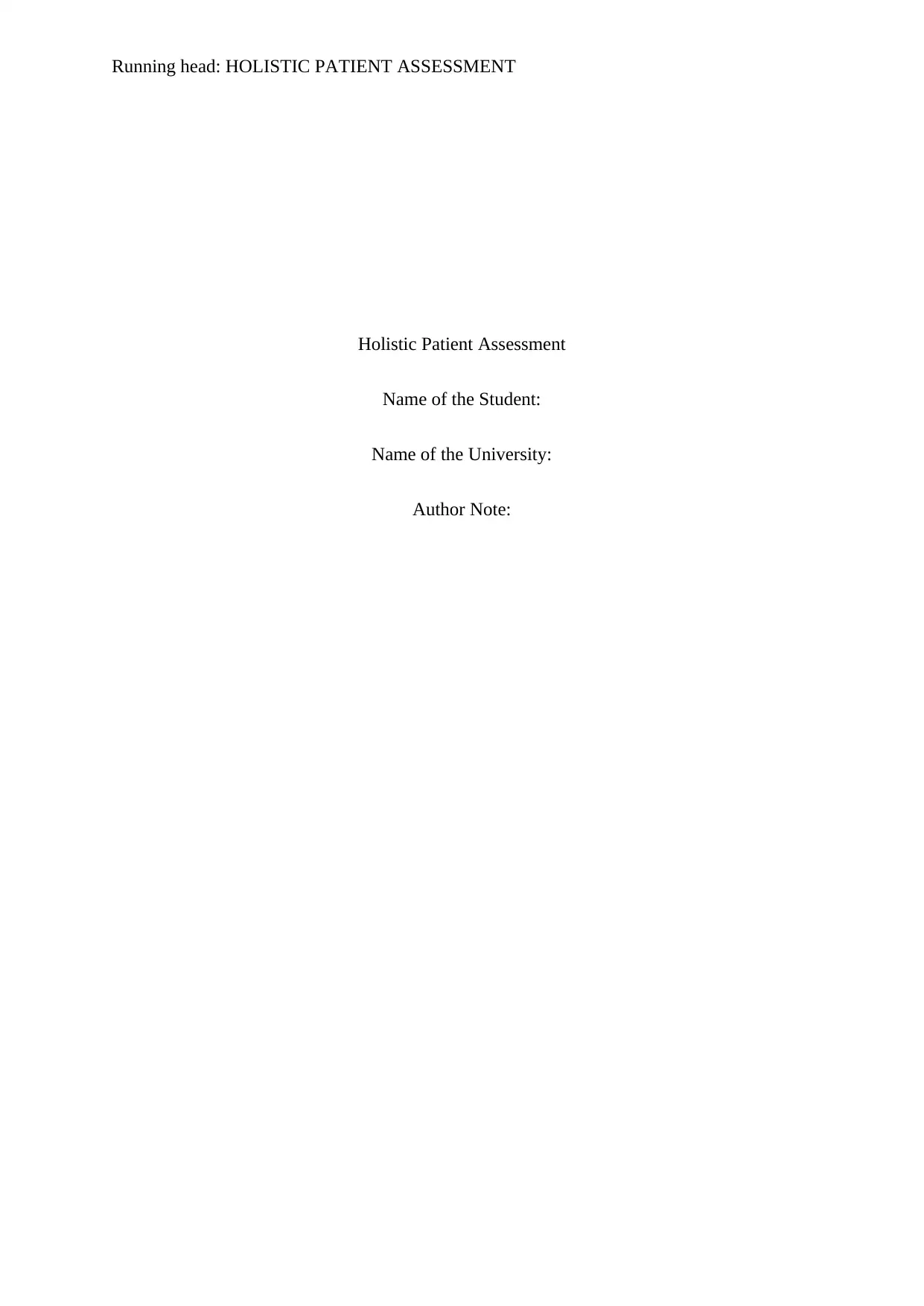
Running head: HOLISTIC PATIENT ASSESSMENT
Holistic Patient Assessment
Name of the Student:
Name of the University:
Author Note:
Holistic Patient Assessment
Name of the Student:
Name of the University:
Author Note:
Paraphrase This Document
Need a fresh take? Get an instant paraphrase of this document with our AI Paraphraser
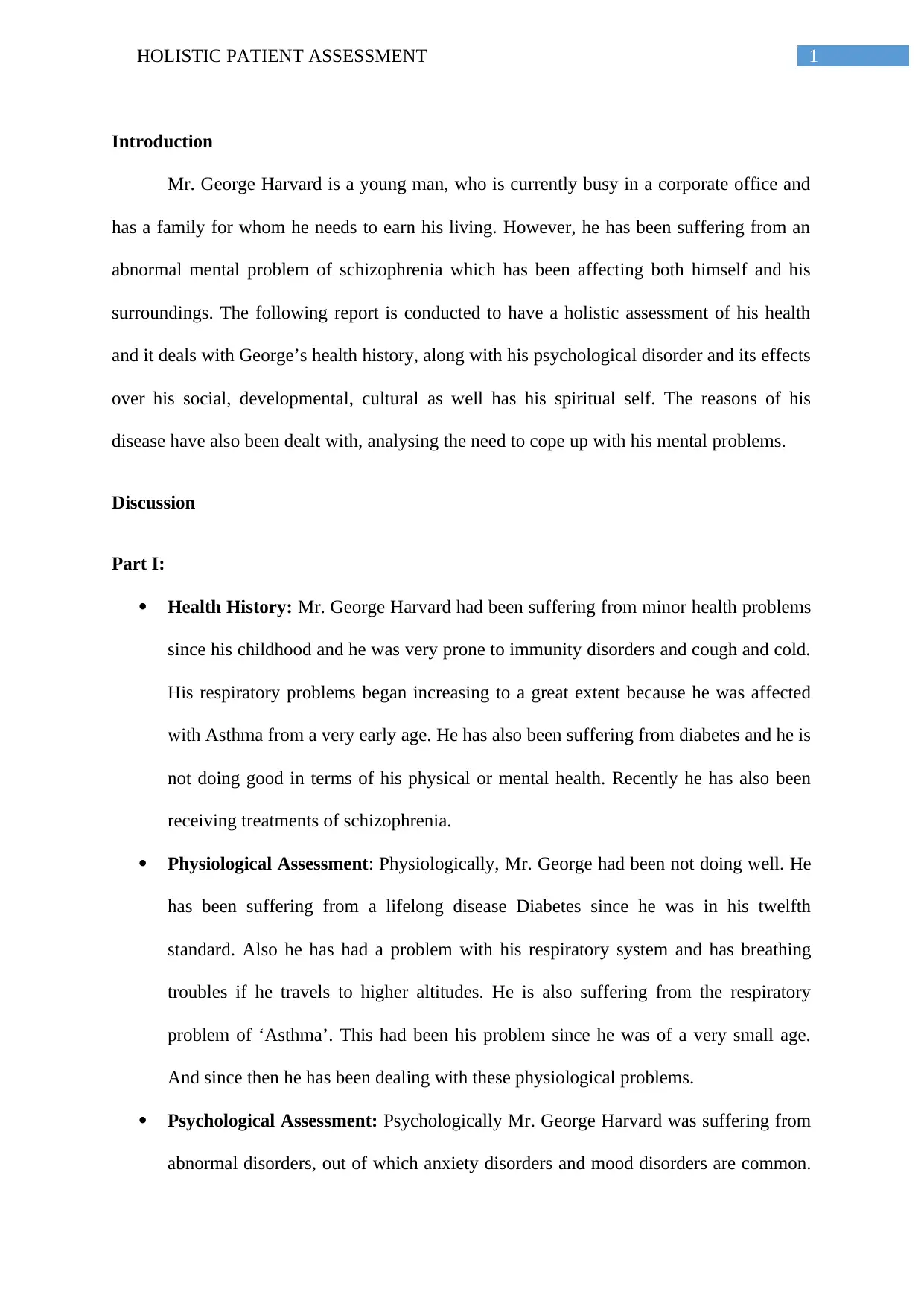
1HOLISTIC PATIENT ASSESSMENT
Introduction
Mr. George Harvard is a young man, who is currently busy in a corporate office and
has a family for whom he needs to earn his living. However, he has been suffering from an
abnormal mental problem of schizophrenia which has been affecting both himself and his
surroundings. The following report is conducted to have a holistic assessment of his health
and it deals with George’s health history, along with his psychological disorder and its effects
over his social, developmental, cultural as well has his spiritual self. The reasons of his
disease have also been dealt with, analysing the need to cope up with his mental problems.
Discussion
Part I:
Health History: Mr. George Harvard had been suffering from minor health problems
since his childhood and he was very prone to immunity disorders and cough and cold.
His respiratory problems began increasing to a great extent because he was affected
with Asthma from a very early age. He has also been suffering from diabetes and he is
not doing good in terms of his physical or mental health. Recently he has also been
receiving treatments of schizophrenia.
Physiological Assessment: Physiologically, Mr. George had been not doing well. He
has been suffering from a lifelong disease Diabetes since he was in his twelfth
standard. Also he has had a problem with his respiratory system and has breathing
troubles if he travels to higher altitudes. He is also suffering from the respiratory
problem of ‘Asthma’. This had been his problem since he was of a very small age.
And since then he has been dealing with these physiological problems.
Psychological Assessment: Psychologically Mr. George Harvard was suffering from
abnormal disorders, out of which anxiety disorders and mood disorders are common.
Introduction
Mr. George Harvard is a young man, who is currently busy in a corporate office and
has a family for whom he needs to earn his living. However, he has been suffering from an
abnormal mental problem of schizophrenia which has been affecting both himself and his
surroundings. The following report is conducted to have a holistic assessment of his health
and it deals with George’s health history, along with his psychological disorder and its effects
over his social, developmental, cultural as well has his spiritual self. The reasons of his
disease have also been dealt with, analysing the need to cope up with his mental problems.
Discussion
Part I:
Health History: Mr. George Harvard had been suffering from minor health problems
since his childhood and he was very prone to immunity disorders and cough and cold.
His respiratory problems began increasing to a great extent because he was affected
with Asthma from a very early age. He has also been suffering from diabetes and he is
not doing good in terms of his physical or mental health. Recently he has also been
receiving treatments of schizophrenia.
Physiological Assessment: Physiologically, Mr. George had been not doing well. He
has been suffering from a lifelong disease Diabetes since he was in his twelfth
standard. Also he has had a problem with his respiratory system and has breathing
troubles if he travels to higher altitudes. He is also suffering from the respiratory
problem of ‘Asthma’. This had been his problem since he was of a very small age.
And since then he has been dealing with these physiological problems.
Psychological Assessment: Psychologically Mr. George Harvard was suffering from
abnormal disorders, out of which anxiety disorders and mood disorders are common.
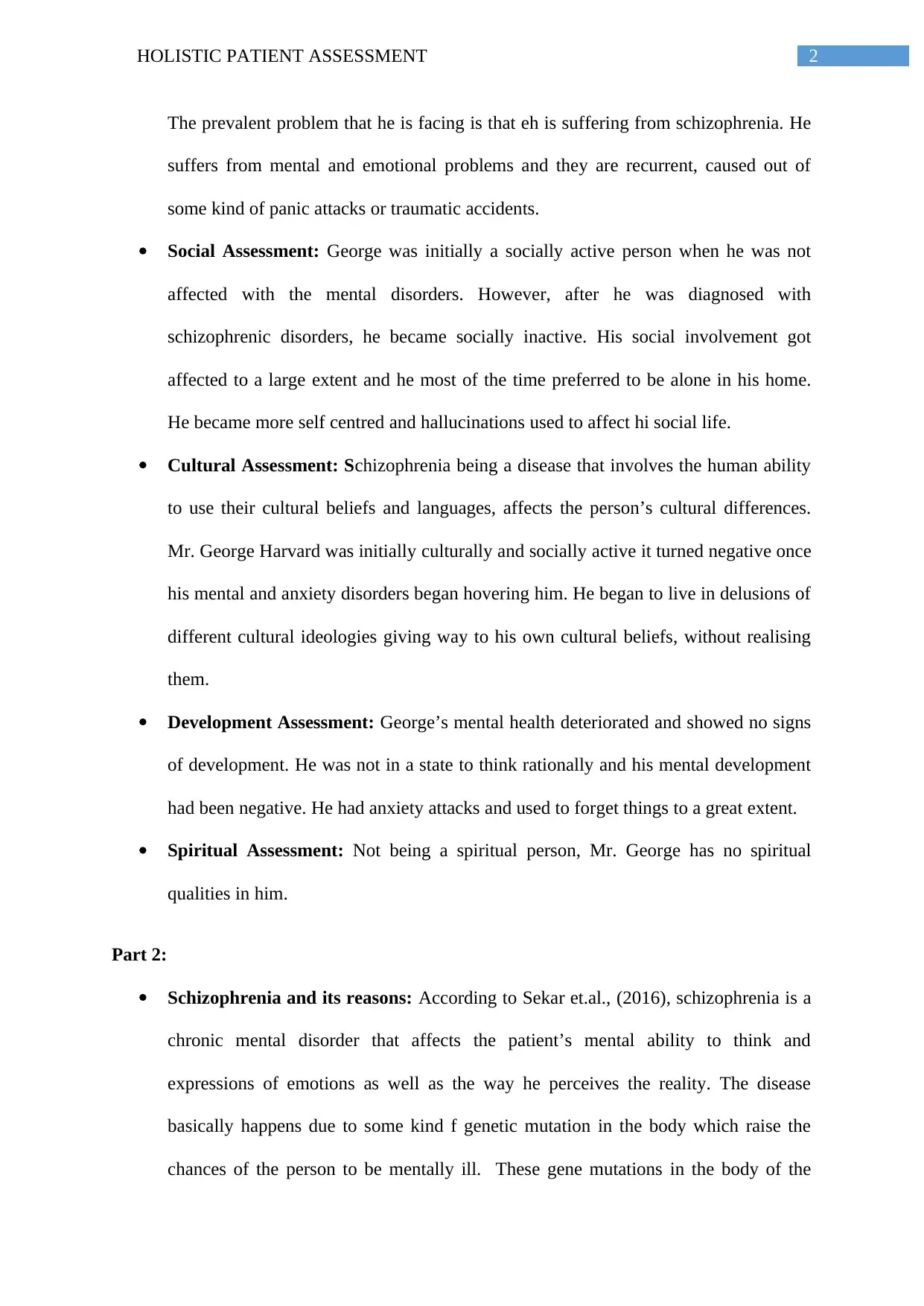
2HOLISTIC PATIENT ASSESSMENT
The prevalent problem that he is facing is that eh is suffering from schizophrenia. He
suffers from mental and emotional problems and they are recurrent, caused out of
some kind of panic attacks or traumatic accidents.
Social Assessment: George was initially a socially active person when he was not
affected with the mental disorders. However, after he was diagnosed with
schizophrenic disorders, he became socially inactive. His social involvement got
affected to a large extent and he most of the time preferred to be alone in his home.
He became more self centred and hallucinations used to affect hi social life.
Cultural Assessment: Schizophrenia being a disease that involves the human ability
to use their cultural beliefs and languages, affects the person’s cultural differences.
Mr. George Harvard was initially culturally and socially active it turned negative once
his mental and anxiety disorders began hovering him. He began to live in delusions of
different cultural ideologies giving way to his own cultural beliefs, without realising
them.
Development Assessment: George’s mental health deteriorated and showed no signs
of development. He was not in a state to think rationally and his mental development
had been negative. He had anxiety attacks and used to forget things to a great extent.
Spiritual Assessment: Not being a spiritual person, Mr. George has no spiritual
qualities in him.
Part 2:
Schizophrenia and its reasons: According to Sekar et.al., (2016), schizophrenia is a
chronic mental disorder that affects the patient’s mental ability to think and
expressions of emotions as well as the way he perceives the reality. The disease
basically happens due to some kind f genetic mutation in the body which raise the
chances of the person to be mentally ill. These gene mutations in the body of the
The prevalent problem that he is facing is that eh is suffering from schizophrenia. He
suffers from mental and emotional problems and they are recurrent, caused out of
some kind of panic attacks or traumatic accidents.
Social Assessment: George was initially a socially active person when he was not
affected with the mental disorders. However, after he was diagnosed with
schizophrenic disorders, he became socially inactive. His social involvement got
affected to a large extent and he most of the time preferred to be alone in his home.
He became more self centred and hallucinations used to affect hi social life.
Cultural Assessment: Schizophrenia being a disease that involves the human ability
to use their cultural beliefs and languages, affects the person’s cultural differences.
Mr. George Harvard was initially culturally and socially active it turned negative once
his mental and anxiety disorders began hovering him. He began to live in delusions of
different cultural ideologies giving way to his own cultural beliefs, without realising
them.
Development Assessment: George’s mental health deteriorated and showed no signs
of development. He was not in a state to think rationally and his mental development
had been negative. He had anxiety attacks and used to forget things to a great extent.
Spiritual Assessment: Not being a spiritual person, Mr. George has no spiritual
qualities in him.
Part 2:
Schizophrenia and its reasons: According to Sekar et.al., (2016), schizophrenia is a
chronic mental disorder that affects the patient’s mental ability to think and
expressions of emotions as well as the way he perceives the reality. The disease
basically happens due to some kind f genetic mutation in the body which raise the
chances of the person to be mentally ill. These gene mutations in the body of the
⊘ This is a preview!⊘
Do you want full access?
Subscribe today to unlock all pages.

Trusted by 1+ million students worldwide
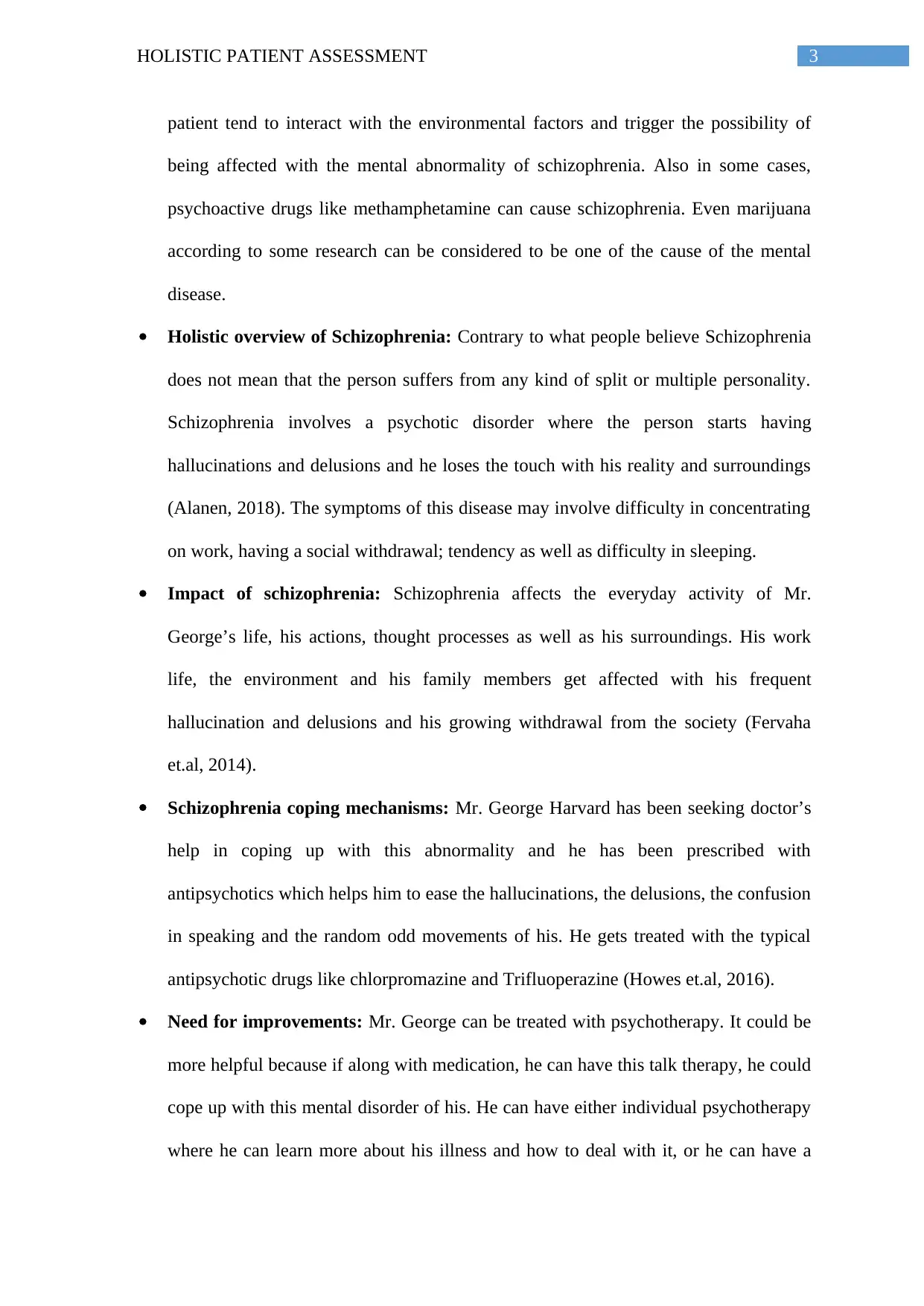
3HOLISTIC PATIENT ASSESSMENT
patient tend to interact with the environmental factors and trigger the possibility of
being affected with the mental abnormality of schizophrenia. Also in some cases,
psychoactive drugs like methamphetamine can cause schizophrenia. Even marijuana
according to some research can be considered to be one of the cause of the mental
disease.
Holistic overview of Schizophrenia: Contrary to what people believe Schizophrenia
does not mean that the person suffers from any kind of split or multiple personality.
Schizophrenia involves a psychotic disorder where the person starts having
hallucinations and delusions and he loses the touch with his reality and surroundings
(Alanen, 2018). The symptoms of this disease may involve difficulty in concentrating
on work, having a social withdrawal; tendency as well as difficulty in sleeping.
Impact of schizophrenia: Schizophrenia affects the everyday activity of Mr.
George’s life, his actions, thought processes as well as his surroundings. His work
life, the environment and his family members get affected with his frequent
hallucination and delusions and his growing withdrawal from the society (Fervaha
et.al, 2014).
Schizophrenia coping mechanisms: Mr. George Harvard has been seeking doctor’s
help in coping up with this abnormality and he has been prescribed with
antipsychotics which helps him to ease the hallucinations, the delusions, the confusion
in speaking and the random odd movements of his. He gets treated with the typical
antipsychotic drugs like chlorpromazine and Trifluoperazine (Howes et.al, 2016).
Need for improvements: Mr. George can be treated with psychotherapy. It could be
more helpful because if along with medication, he can have this talk therapy, he could
cope up with this mental disorder of his. He can have either individual psychotherapy
where he can learn more about his illness and how to deal with it, or he can have a
patient tend to interact with the environmental factors and trigger the possibility of
being affected with the mental abnormality of schizophrenia. Also in some cases,
psychoactive drugs like methamphetamine can cause schizophrenia. Even marijuana
according to some research can be considered to be one of the cause of the mental
disease.
Holistic overview of Schizophrenia: Contrary to what people believe Schizophrenia
does not mean that the person suffers from any kind of split or multiple personality.
Schizophrenia involves a psychotic disorder where the person starts having
hallucinations and delusions and he loses the touch with his reality and surroundings
(Alanen, 2018). The symptoms of this disease may involve difficulty in concentrating
on work, having a social withdrawal; tendency as well as difficulty in sleeping.
Impact of schizophrenia: Schizophrenia affects the everyday activity of Mr.
George’s life, his actions, thought processes as well as his surroundings. His work
life, the environment and his family members get affected with his frequent
hallucination and delusions and his growing withdrawal from the society (Fervaha
et.al, 2014).
Schizophrenia coping mechanisms: Mr. George Harvard has been seeking doctor’s
help in coping up with this abnormality and he has been prescribed with
antipsychotics which helps him to ease the hallucinations, the delusions, the confusion
in speaking and the random odd movements of his. He gets treated with the typical
antipsychotic drugs like chlorpromazine and Trifluoperazine (Howes et.al, 2016).
Need for improvements: Mr. George can be treated with psychotherapy. It could be
more helpful because if along with medication, he can have this talk therapy, he could
cope up with this mental disorder of his. He can have either individual psychotherapy
where he can learn more about his illness and how to deal with it, or he can have a
Paraphrase This Document
Need a fresh take? Get an instant paraphrase of this document with our AI Paraphraser
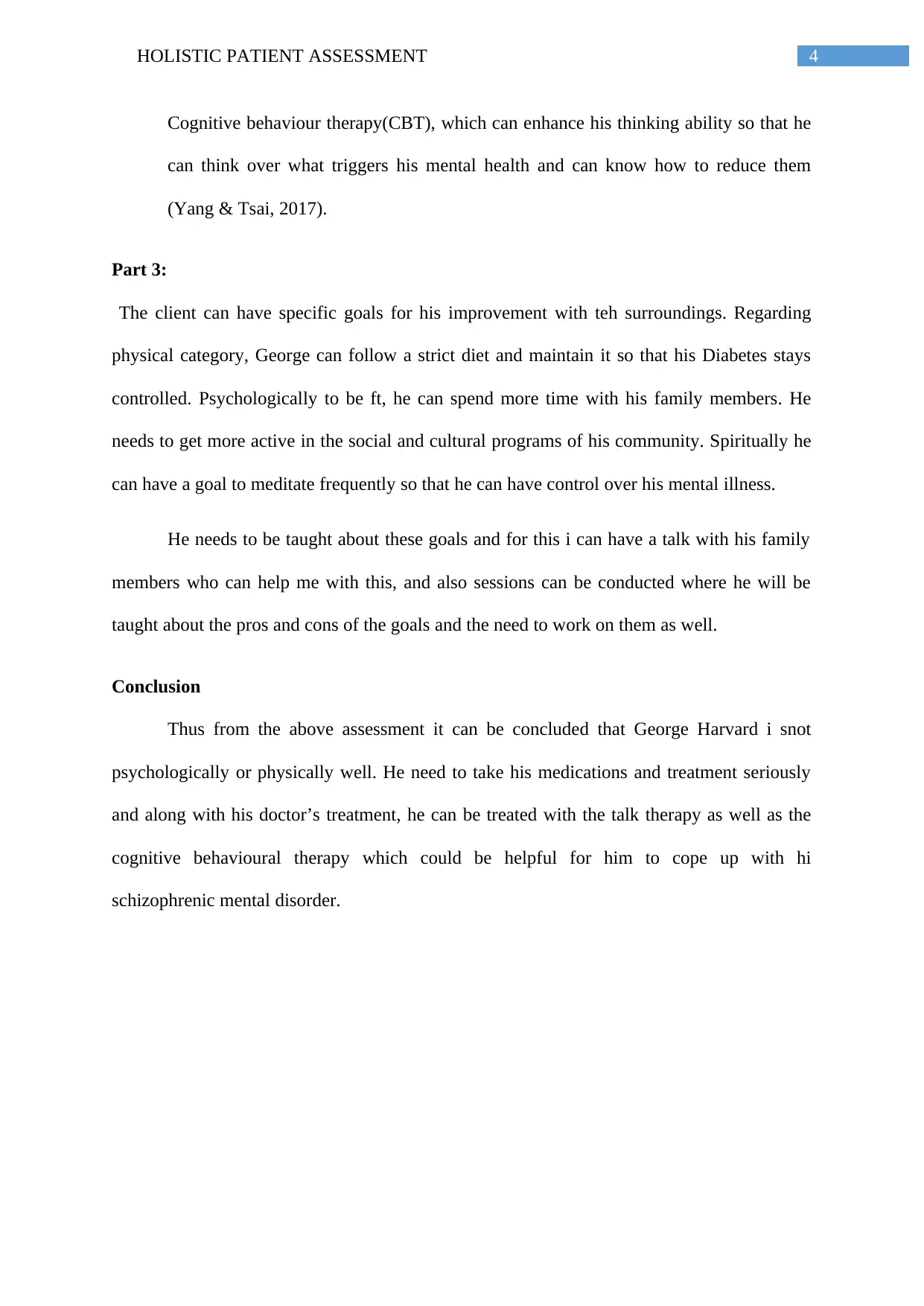
4HOLISTIC PATIENT ASSESSMENT
Cognitive behaviour therapy(CBT), which can enhance his thinking ability so that he
can think over what triggers his mental health and can know how to reduce them
(Yang & Tsai, 2017).
Part 3:
The client can have specific goals for his improvement with teh surroundings. Regarding
physical category, George can follow a strict diet and maintain it so that his Diabetes stays
controlled. Psychologically to be ft, he can spend more time with his family members. He
needs to get more active in the social and cultural programs of his community. Spiritually he
can have a goal to meditate frequently so that he can have control over his mental illness.
He needs to be taught about these goals and for this i can have a talk with his family
members who can help me with this, and also sessions can be conducted where he will be
taught about the pros and cons of the goals and the need to work on them as well.
Conclusion
Thus from the above assessment it can be concluded that George Harvard i snot
psychologically or physically well. He need to take his medications and treatment seriously
and along with his doctor’s treatment, he can be treated with the talk therapy as well as the
cognitive behavioural therapy which could be helpful for him to cope up with hi
schizophrenic mental disorder.
Cognitive behaviour therapy(CBT), which can enhance his thinking ability so that he
can think over what triggers his mental health and can know how to reduce them
(Yang & Tsai, 2017).
Part 3:
The client can have specific goals for his improvement with teh surroundings. Regarding
physical category, George can follow a strict diet and maintain it so that his Diabetes stays
controlled. Psychologically to be ft, he can spend more time with his family members. He
needs to get more active in the social and cultural programs of his community. Spiritually he
can have a goal to meditate frequently so that he can have control over his mental illness.
He needs to be taught about these goals and for this i can have a talk with his family
members who can help me with this, and also sessions can be conducted where he will be
taught about the pros and cons of the goals and the need to work on them as well.
Conclusion
Thus from the above assessment it can be concluded that George Harvard i snot
psychologically or physically well. He need to take his medications and treatment seriously
and along with his doctor’s treatment, he can be treated with the talk therapy as well as the
cognitive behavioural therapy which could be helpful for him to cope up with hi
schizophrenic mental disorder.
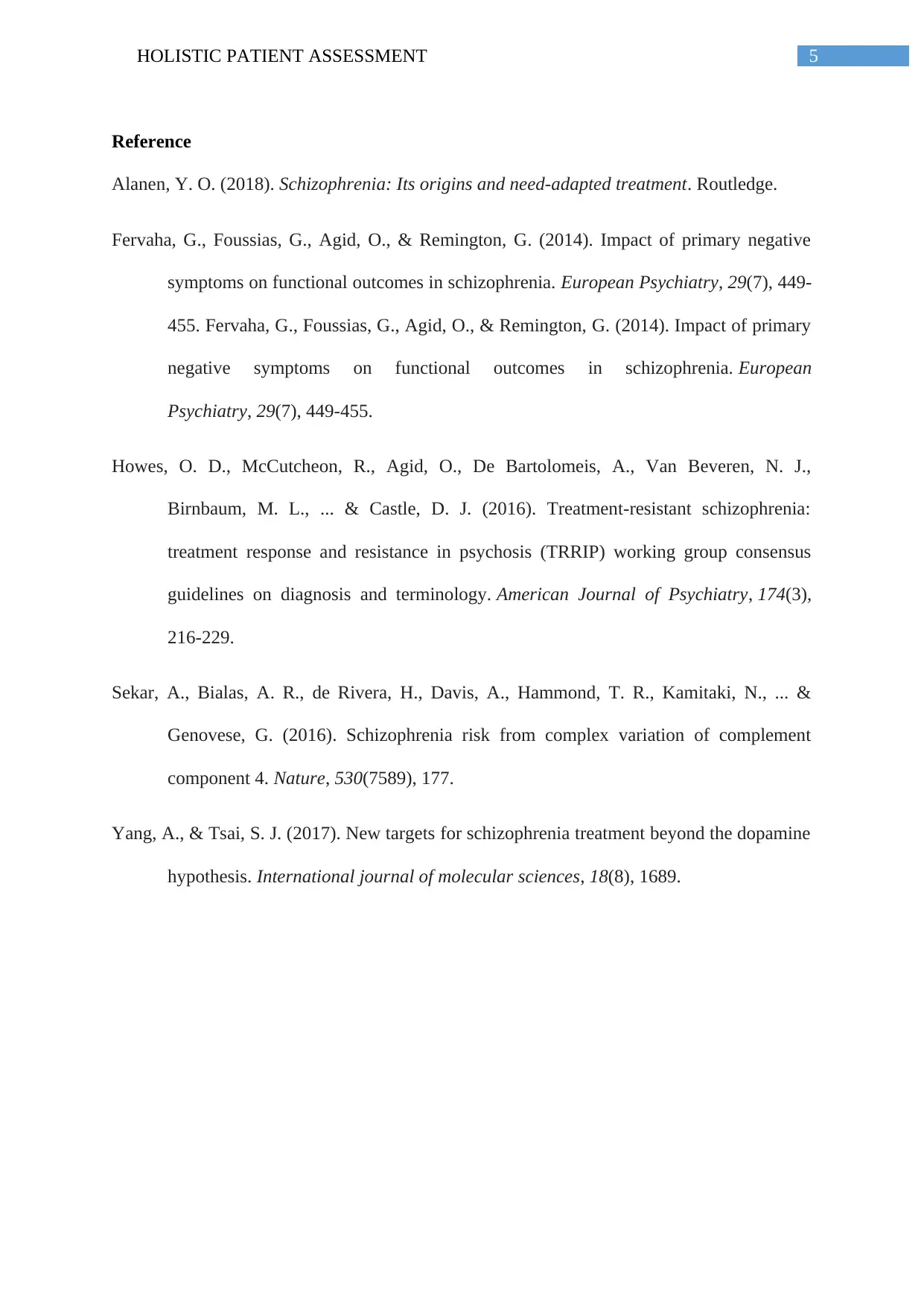
5HOLISTIC PATIENT ASSESSMENT
Reference
Alanen, Y. O. (2018). Schizophrenia: Its origins and need-adapted treatment. Routledge.
Fervaha, G., Foussias, G., Agid, O., & Remington, G. (2014). Impact of primary negative
symptoms on functional outcomes in schizophrenia. European Psychiatry, 29(7), 449-
455. Fervaha, G., Foussias, G., Agid, O., & Remington, G. (2014). Impact of primary
negative symptoms on functional outcomes in schizophrenia. European
Psychiatry, 29(7), 449-455.
Howes, O. D., McCutcheon, R., Agid, O., De Bartolomeis, A., Van Beveren, N. J.,
Birnbaum, M. L., ... & Castle, D. J. (2016). Treatment-resistant schizophrenia:
treatment response and resistance in psychosis (TRRIP) working group consensus
guidelines on diagnosis and terminology. American Journal of Psychiatry, 174(3),
216-229.
Sekar, A., Bialas, A. R., de Rivera, H., Davis, A., Hammond, T. R., Kamitaki, N., ... &
Genovese, G. (2016). Schizophrenia risk from complex variation of complement
component 4. Nature, 530(7589), 177.
Yang, A., & Tsai, S. J. (2017). New targets for schizophrenia treatment beyond the dopamine
hypothesis. International journal of molecular sciences, 18(8), 1689.
Reference
Alanen, Y. O. (2018). Schizophrenia: Its origins and need-adapted treatment. Routledge.
Fervaha, G., Foussias, G., Agid, O., & Remington, G. (2014). Impact of primary negative
symptoms on functional outcomes in schizophrenia. European Psychiatry, 29(7), 449-
455. Fervaha, G., Foussias, G., Agid, O., & Remington, G. (2014). Impact of primary
negative symptoms on functional outcomes in schizophrenia. European
Psychiatry, 29(7), 449-455.
Howes, O. D., McCutcheon, R., Agid, O., De Bartolomeis, A., Van Beveren, N. J.,
Birnbaum, M. L., ... & Castle, D. J. (2016). Treatment-resistant schizophrenia:
treatment response and resistance in psychosis (TRRIP) working group consensus
guidelines on diagnosis and terminology. American Journal of Psychiatry, 174(3),
216-229.
Sekar, A., Bialas, A. R., de Rivera, H., Davis, A., Hammond, T. R., Kamitaki, N., ... &
Genovese, G. (2016). Schizophrenia risk from complex variation of complement
component 4. Nature, 530(7589), 177.
Yang, A., & Tsai, S. J. (2017). New targets for schizophrenia treatment beyond the dopamine
hypothesis. International journal of molecular sciences, 18(8), 1689.
⊘ This is a preview!⊘
Do you want full access?
Subscribe today to unlock all pages.

Trusted by 1+ million students worldwide
1 out of 6
Related Documents
Your All-in-One AI-Powered Toolkit for Academic Success.
+13062052269
info@desklib.com
Available 24*7 on WhatsApp / Email
![[object Object]](/_next/static/media/star-bottom.7253800d.svg)
Unlock your academic potential
Copyright © 2020–2026 A2Z Services. All Rights Reserved. Developed and managed by ZUCOL.





